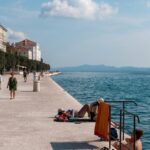ZAGREB, March 30, 2018 – A round table on education, focusing on global processes designed to improve education, comparison of achievements, and specific proposals for improvement of Croatia’s education system, was held in Zagreb on Thursday, with Croatian and foreign experts participating.
The event was organised by the Science and Education Ministry in cooperation with the British Council and the British Embassy, based on the concept “Dialogues on Education”, developed by the British Council.
Croatian Science and Education Minister Blaženka Divjak invited to the event the Director for Education and Skills and Special Advisor on Education Policy to the Secretary-General at the Organisation for Economic Co-operation and Development (OECD) Andreas Schleicher, the former head of Her Majesty’s Inspectorate of Education (HMIE) and Chief Professional Advisor on Education to the Scottish Government Graham Donaldson, and the director-general for pre-school and primary education of the Slovenian Science, Education and Sports Ministry, Gregor Mohorčič.
Schleicher said that Croatia’s efforts to reform its education system in order to make it serve progress rather than the past, which, he said, was difficult, were promising. He told reporters that he viewed that process in Croatia with confidence.
Asked what he thought was the weakest aspect of the Croatian education system, Schleicher said that the weakest aspect was the focus on memorising and reproducing facts. A modern society does not ask what you know but what you can do with what you know, he noted. That is a real weak point of the education system because the capacity of students to creatively apply the acquired knowledge and solve complex problems is poor, he said. He said that PISA surveys bore evidence of this and that he therefore believed that the curricular reform would create a better connection between educational institutions and labour market needs in Croatia.
Schleicher noted that Croatia, as well as most other countries, was faced with the fact that changes were happening much faster than the process of defining appropriate responses to them. The reforms may seem radical and overly ambitious to some, but they are very mild compared to the challenges of the future, said Schleicher.
Science and Education Minister Divjak said that a comparative report on education processes presented by Schleicher showed that Croatia was lagging behind other countries, with overloaded curricula appropriate for the first rather than the fourth industrial revolution. She said the current pace of reform was the “fastest possible” and that Croatia had sufficient will and capacity to implement the reform processes.
The minister recalled that in the autumn the experimental implementation of the education reform would start in 72 schools and that it would show what had to be changed and in what way, as well as how teachers and students could be supported in those reforms that had to happen.
Asked about a survey which showed that Croatian teachers are very dissatisfied, she said that teachers were the most unhappy about their social status, which, she said, had more to do with how they were perceived and how their work was valued by the society rather than with their financial status.







